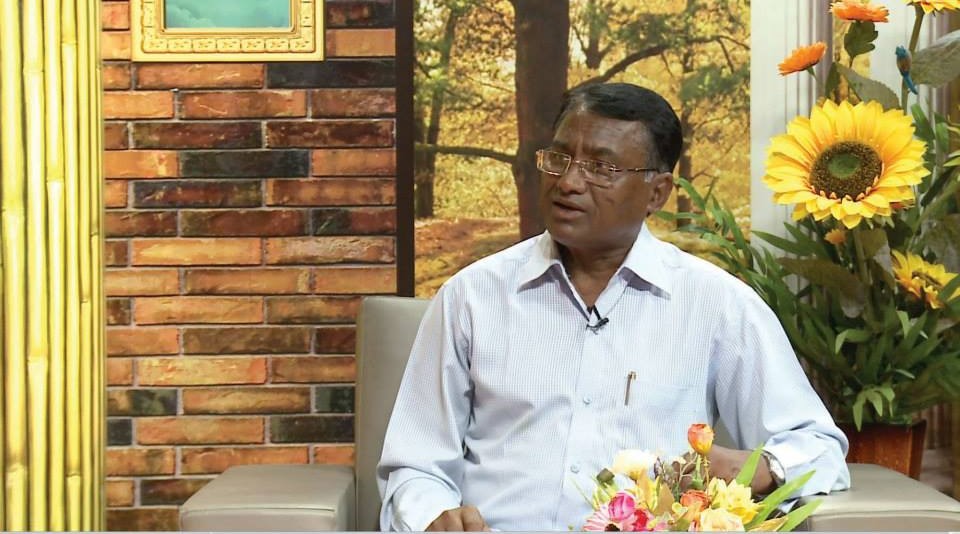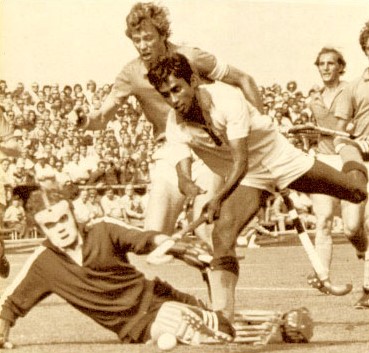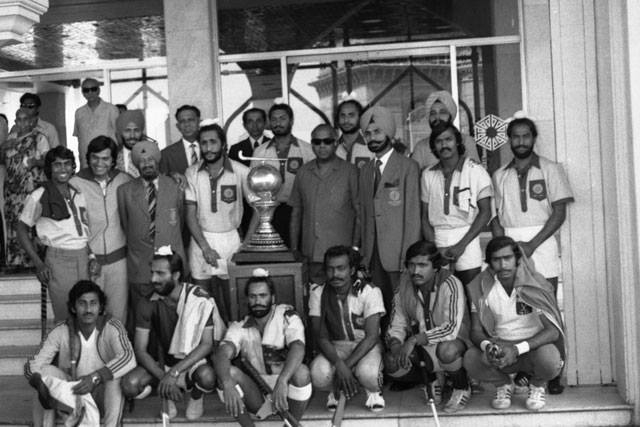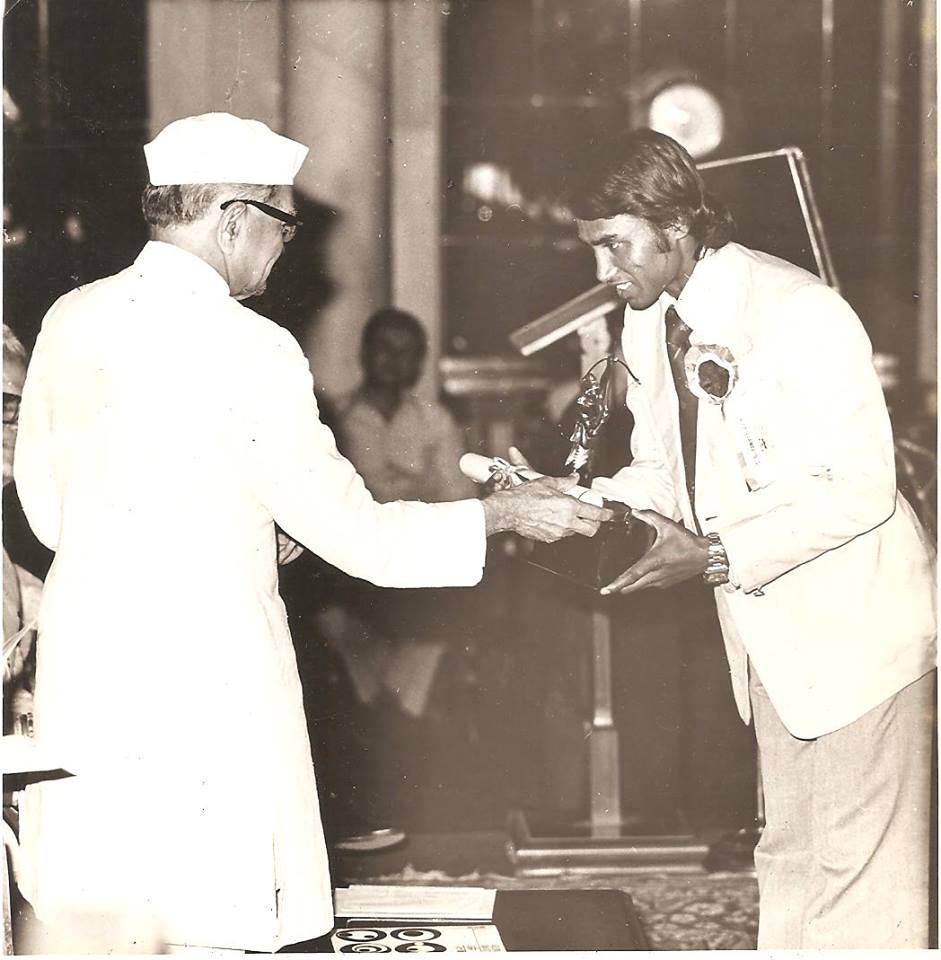Begin typing your search above and press return to search.
Forgotten Heroes
How Ashok Kumar delivered India’s biggest moment at 1975 World Cup

‘Hockey Wizard’ late Major Dhyan Chand is undoubtedly the ‘biggest legend’ of Indian hockey. Although he was clearly in a league of his own, his son Ashok Kumar is no less a ‘legend’ having contributed outstandingly for the national team over his ten-year international career. The most striking was giving Indian hockey its ‘biggest moment’ on the world stage – pulling off the match-clincher at the 1975 World Cup final against Pakistan at Kuala Lumpur, where the Blueshirts notched up a pugnacious come-from-behind 2-1 victory over their arch-rivals. Taking a stroll down memory lane, Kumar, who is now leading a blissful life in his hometown Jhansi, gets ‘excited’ when the confabulation veers towards the 1975 World Cup. “The Indian team had checked into the Merlin hotel in Kuala Lumpur, and I could see the World Cup trophy being kept at the hotel lobby. On seeing the World Cup, many thoughts were crossing my mind as to how we had nearly missed the gold medal at the 1973 World Cup final losing to the Netherlands in a shootout, and we were really determined to turn it around in Kuala Lumpur," the 69-year-old soft-spoken former ace forward opens up in a freewheeling chat.  Image: Wills Book of Excellence - Hockey Ashok, who was featuring in his third World Cup (played in the 1971 and 1973 World Cups), shared an interesting anecdote when India earned a penalty stroke in the dying moments of the 1973 World Cup final match against the Netherlands, which BP Govinda missed. “It was decided that either Harmik Singh or Ajit Pal Singh would take the penalty stroke in case we earned one. But both were reluctant to take the stroke and Govinda stepped in. I still remember how the Dutch goalkeeper had dived to his right early, but Govinda’s feeble push towards the left tricked out. Probably the big game nerves got to him although he is a fantastic player,” the demure Ashok traces four-decade-old memories. Kumar, who played for a lengthy period for Indian Airlines at the domestic level, also touched upon the World Cup preparations of the national team and how the Punjab government put their best foot forward in ensuring the team got the best facilities preparation-wise. “In those days, national camps used to be held in NIS Patiala, where we used to get Rs 20-25 for our daily diet, but Punjab Chief Minister Zail Singh wanted the national camp to be held at Chandigarh. We were given Rs 50 for our daily diet and the training sessions were held at the Chandigarh University grounds – we used to stay in the Chandigarh University hostel – all arrangements were near-perfect. There was a girls’ hostel across the road and the whole training environment was good, as thousands would turn up to watch us go through the practise drills in the morning as well as in the evening,” Kumar recalls with a grin.
Image: Wills Book of Excellence - Hockey Ashok, who was featuring in his third World Cup (played in the 1971 and 1973 World Cups), shared an interesting anecdote when India earned a penalty stroke in the dying moments of the 1973 World Cup final match against the Netherlands, which BP Govinda missed. “It was decided that either Harmik Singh or Ajit Pal Singh would take the penalty stroke in case we earned one. But both were reluctant to take the stroke and Govinda stepped in. I still remember how the Dutch goalkeeper had dived to his right early, but Govinda’s feeble push towards the left tricked out. Probably the big game nerves got to him although he is a fantastic player,” the demure Ashok traces four-decade-old memories. Kumar, who played for a lengthy period for Indian Airlines at the domestic level, also touched upon the World Cup preparations of the national team and how the Punjab government put their best foot forward in ensuring the team got the best facilities preparation-wise. “In those days, national camps used to be held in NIS Patiala, where we used to get Rs 20-25 for our daily diet, but Punjab Chief Minister Zail Singh wanted the national camp to be held at Chandigarh. We were given Rs 50 for our daily diet and the training sessions were held at the Chandigarh University grounds – we used to stay in the Chandigarh University hostel – all arrangements were near-perfect. There was a girls’ hostel across the road and the whole training environment was good, as thousands would turn up to watch us go through the practise drills in the morning as well as in the evening,” Kumar recalls with a grin.  India 1975 World Cup wining team.Ashok Kumar with towel in shoulder Indian hockey was on a high’ those days and competition for places in the side was immense. “70 to 80 boys will be summoned for national camps in our playing days and obviously only the very best would get picked."
India 1975 World Cup wining team.Ashok Kumar with towel in shoulder Indian hockey was on a high’ those days and competition for places in the side was immense. “70 to 80 boys will be summoned for national camps in our playing days and obviously only the very best would get picked."  Ashok Kumar receiving Arjuna Award in 1974 Kumar may have played four World Cups, three Asian Games and two Olympics, but he felt that elements were at play to derail his playing career. “I still recall how a then IHF observer send out a message to our manager Balbir Singh Senior in Kuala Lumpur not to play me at the 1975 World Cup - in fact, I was only included as the 16th member of that World Cup side. I do my job of training, playing and going home, without trying to please anyone - maybe people who matter took it as my arrogance and looked at means to scupper my playing chances. For me self-respect is everything and I just did what I learnt from my father that is to play hockey honestly.” Kumar, who had also turned down a lucrative offer to play in Italy in 1974, believes with a little bit of luck he could have played in the 1980 Olympics. “I was the national camp for the 1979 Champions Trophy that was to be held in Pakistan, but my father expired around that time and destiny had other plans for me,” he signs off with a tinge of remorse.
Ashok Kumar receiving Arjuna Award in 1974 Kumar may have played four World Cups, three Asian Games and two Olympics, but he felt that elements were at play to derail his playing career. “I still recall how a then IHF observer send out a message to our manager Balbir Singh Senior in Kuala Lumpur not to play me at the 1975 World Cup - in fact, I was only included as the 16th member of that World Cup side. I do my job of training, playing and going home, without trying to please anyone - maybe people who matter took it as my arrogance and looked at means to scupper my playing chances. For me self-respect is everything and I just did what I learnt from my father that is to play hockey honestly.” Kumar, who had also turned down a lucrative offer to play in Italy in 1974, believes with a little bit of luck he could have played in the 1980 Olympics. “I was the national camp for the 1979 Champions Trophy that was to be held in Pakistan, but my father expired around that time and destiny had other plans for me,” he signs off with a tinge of remorse.
 Image: Wills Book of Excellence - Hockey Ashok, who was featuring in his third World Cup (played in the 1971 and 1973 World Cups), shared an interesting anecdote when India earned a penalty stroke in the dying moments of the 1973 World Cup final match against the Netherlands, which BP Govinda missed. “It was decided that either Harmik Singh or Ajit Pal Singh would take the penalty stroke in case we earned one. But both were reluctant to take the stroke and Govinda stepped in. I still remember how the Dutch goalkeeper had dived to his right early, but Govinda’s feeble push towards the left tricked out. Probably the big game nerves got to him although he is a fantastic player,” the demure Ashok traces four-decade-old memories. Kumar, who played for a lengthy period for Indian Airlines at the domestic level, also touched upon the World Cup preparations of the national team and how the Punjab government put their best foot forward in ensuring the team got the best facilities preparation-wise. “In those days, national camps used to be held in NIS Patiala, where we used to get Rs 20-25 for our daily diet, but Punjab Chief Minister Zail Singh wanted the national camp to be held at Chandigarh. We were given Rs 50 for our daily diet and the training sessions were held at the Chandigarh University grounds – we used to stay in the Chandigarh University hostel – all arrangements were near-perfect. There was a girls’ hostel across the road and the whole training environment was good, as thousands would turn up to watch us go through the practise drills in the morning as well as in the evening,” Kumar recalls with a grin.
Image: Wills Book of Excellence - Hockey Ashok, who was featuring in his third World Cup (played in the 1971 and 1973 World Cups), shared an interesting anecdote when India earned a penalty stroke in the dying moments of the 1973 World Cup final match against the Netherlands, which BP Govinda missed. “It was decided that either Harmik Singh or Ajit Pal Singh would take the penalty stroke in case we earned one. But both were reluctant to take the stroke and Govinda stepped in. I still remember how the Dutch goalkeeper had dived to his right early, but Govinda’s feeble push towards the left tricked out. Probably the big game nerves got to him although he is a fantastic player,” the demure Ashok traces four-decade-old memories. Kumar, who played for a lengthy period for Indian Airlines at the domestic level, also touched upon the World Cup preparations of the national team and how the Punjab government put their best foot forward in ensuring the team got the best facilities preparation-wise. “In those days, national camps used to be held in NIS Patiala, where we used to get Rs 20-25 for our daily diet, but Punjab Chief Minister Zail Singh wanted the national camp to be held at Chandigarh. We were given Rs 50 for our daily diet and the training sessions were held at the Chandigarh University grounds – we used to stay in the Chandigarh University hostel – all arrangements were near-perfect. There was a girls’ hostel across the road and the whole training environment was good, as thousands would turn up to watch us go through the practise drills in the morning as well as in the evening,” Kumar recalls with a grin.  India 1975 World Cup wining team.Ashok Kumar with towel in shoulder Indian hockey was on a high’ those days and competition for places in the side was immense. “70 to 80 boys will be summoned for national camps in our playing days and obviously only the very best would get picked."
India 1975 World Cup wining team.Ashok Kumar with towel in shoulder Indian hockey was on a high’ those days and competition for places in the side was immense. “70 to 80 boys will be summoned for national camps in our playing days and obviously only the very best would get picked." Kumar, who also featured in the 1972 and 1976 Olympics, threw insights into how he and a few of his teammates devised a strategy in their game against then West Germany (now Germany) without the knowledge of the then coach GS Bodhi and manager Balbir Singh Senior. “Germans have always been a top side, and I knew I would be tightly marked. Since I was playing in right-in position and Phillips was playing in right-out position, I asked left fullback Surjit Singh to play the diagonal ball to right-half Varinder Singh, who will feed the ball to Phillips, who will come to my right-in position even as I moved to right-half position - such a ploy worked for us we got the better of West Germany 3-1.” India’s semifinal tie against hosts Malaysia was a tense affair, and Kumar said the Blueshirts had to pull out all stops to conquer the hosts. “We were trailing 1-2 with five minutes to go, and Michael Kindo was replaced by Aslam Sher Khan."It was cut-throat competition as four to five players were battling for one position – so you could well image how tough it was to win a spot in the national side,” he offers his perspective.
Like the semifinal against Malaysia, India had to take the ‘catching up’ route after Pakistan took the lead via Zahid and were sitting pretty at the half-time break. “I had a heated exchange with my team-mates at half-time and felt that we had thirty minutes to corner glory. We held more possession of the ball and me and Govinda decided that both of us would fall back near the 25-yard line every time Pakistan unleashed a counter-attack, which meant we had seven and not five defenders trying to nullify our opponents’ goal-scoring plans,” Kumar reminisces. Fast-forward a little to his World Cup-winning goal against Pakistan in the final, Kumar narrates with a glint of pride how that goal came about. “Harcharan Singh took a long corner, which was intercepted by Ajit Pal Singh, who offered a smart pass to me. I dodged past two or three Pakistani defenders and played it to Phillips on the right, who instead of taking a shot at the Pakistan cage, played the ball to me and I flicked home past the Pakistani goalkeeper. This was after Surjit Singh scored a fierce penalty corner goal to level things up early in the second half.”I engineered a penalty corner from which Aslam placed the ball well enough to take the match into extra time, where Harcharan Singh moved from the left of the striking circle and slammed home to secure India’s march into the final.”
 Ashok Kumar receiving Arjuna Award in 1974 Kumar may have played four World Cups, three Asian Games and two Olympics, but he felt that elements were at play to derail his playing career. “I still recall how a then IHF observer send out a message to our manager Balbir Singh Senior in Kuala Lumpur not to play me at the 1975 World Cup - in fact, I was only included as the 16th member of that World Cup side. I do my job of training, playing and going home, without trying to please anyone - maybe people who matter took it as my arrogance and looked at means to scupper my playing chances. For me self-respect is everything and I just did what I learnt from my father that is to play hockey honestly.” Kumar, who had also turned down a lucrative offer to play in Italy in 1974, believes with a little bit of luck he could have played in the 1980 Olympics. “I was the national camp for the 1979 Champions Trophy that was to be held in Pakistan, but my father expired around that time and destiny had other plans for me,” he signs off with a tinge of remorse.
Ashok Kumar receiving Arjuna Award in 1974 Kumar may have played four World Cups, three Asian Games and two Olympics, but he felt that elements were at play to derail his playing career. “I still recall how a then IHF observer send out a message to our manager Balbir Singh Senior in Kuala Lumpur not to play me at the 1975 World Cup - in fact, I was only included as the 16th member of that World Cup side. I do my job of training, playing and going home, without trying to please anyone - maybe people who matter took it as my arrogance and looked at means to scupper my playing chances. For me self-respect is everything and I just did what I learnt from my father that is to play hockey honestly.” Kumar, who had also turned down a lucrative offer to play in Italy in 1974, believes with a little bit of luck he could have played in the 1980 Olympics. “I was the national camp for the 1979 Champions Trophy that was to be held in Pakistan, but my father expired around that time and destiny had other plans for me,” he signs off with a tinge of remorse.Next Story

